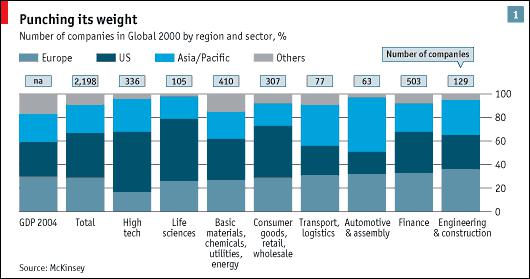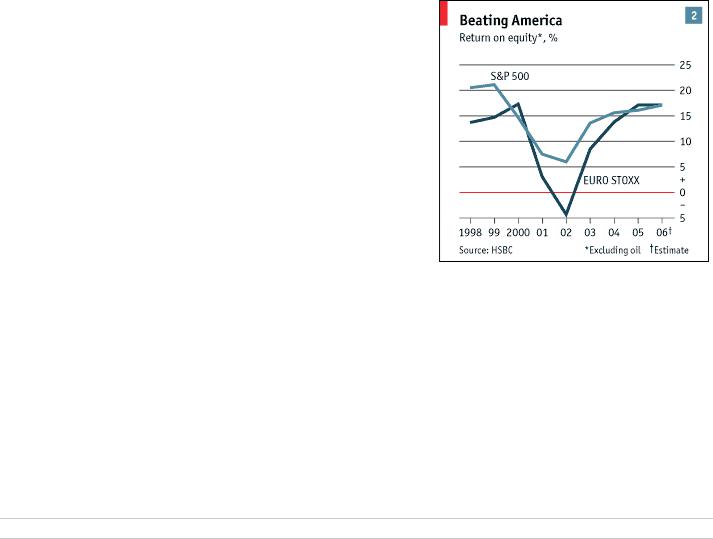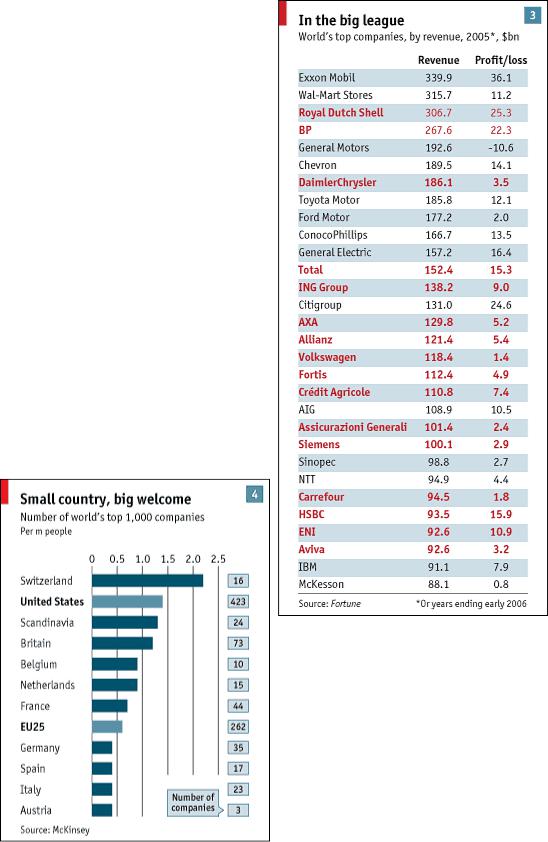
- •Politics this week
- •Business this week
- •On Israel and the Jewish diaspora
- •Who are the champions?
- •Tomorrow the world
- •Home and abroad
- •Driving east
- •In the steps of Adidas
- •The chic and the cheerless
- •Not what it was
- •Funny business
- •Acknowledgments
- •Offer to readers
- •The Richard Casement internship
- •David Rattray
- •Overview
- •Output, prices and jobs
- •The Economist commodity-price index
- •The Economist poll of forecasters
- •Trade, exchange rates, budget balances and interest rates
- •Markets
- •Trade and output

About sponsorship
Who are the champions?
Feb 8th 2007
From The Economist print edition
Howard Read
European business seems stuck between awesome America and low-cost Asia. In fact it is doing surprisingly well, says Iain Carson
IT IS not difficult to be pessimistic about the future of European business. Compared with the awesome strength of America and the raw power of emerging Asia, Europe is sometimes portrayed as a has-been, excelling in luxury goods, fine food, wines and fashion but weighed down by too many old industries and old ideas. From microchips to microbes, poor old Europe seems to trail in America's and Asia's wake.
America enjoys awesome advantages over Europe. It is a huge, truly single market with a relatively youthful, growing population. It is the world's economic superpower, with much higher productivity than its competitors (though productivity growth has recently been disappointing, and last year was slightly below Europe's). It has world-class universities that work hand in glove with business. Americans have not only won more Nobel prizes, they have turned more scientific advances into profitable businesses than anyone else. Many of these firms have gone on to become the giants of modern business.
It may have been a British scientist, Sir Tim Berners-Lee, working at a laboratory in Switzerland, who invented the world wide web, but America is the home of the internet and all the business sectors it has spawned. And even where Europe is holding its own against America, it seems unable to retain its advantage. Boeing drifted badly in the 1990s as Europe's Airbus made strides, but having merged with McDonnell Douglas the American giant bounced back. It is now taking market share from the Europeans.
America's economic growth, averaging 2.5% a year since 2001, has reflected this dynamic business culture, whereas Europe has managed an average growth rate of barely 1.5% over the same period, though the pace has picked up in the past year. Europe's sluggish performance is often put down to the poor business climate. Rigid labour laws and strong unions make it difficult for firms to fire redundant workers and unattractive to hire new ones. Product markets are not as competitive as America's, and the single European market has yet to become a reality in areas such as banking and services.
Corporate governance too is variable: transparent and world-class in Britain, but often inadequate in continental Europe. In Germany workers sit on boards, and in France even small firms have to have an employees' committee that can make life difficult for management. Minority shareholders do not always get enough say.
Moreover, European governments like to meddle. France has drawn up a list of strategic industries, including casinos, that it thinks need special protection from foreign takeovers. Even Spain, with its new Anglo-Saxon business culture, tried to stop a German utility from taking over a Spanish power company.

Telecom Italia's attempts to hive off its mobile-phone business became highly politicised.
Many European politicians are fearful about the effects of globalisation and the rise of China and India. France's vote against the European constitution in 2005 was partly a protest against globalisation, which is blamed for persistently high unemployment there.
Certainly Asia has been making itself more strongly felt in Europe in recent years. Japan now has car factories in France and the Czech Republic as well as in Britain, and imports from South Korea's resurgent car industry have been causing difficulties at Renault and PSA Peugeot Citroën. India's Tata Group too is planning to export cars to some southern and eastern European markets where they will provide more competition for the traditional west European manufacturers.
Europe's pride
Yet even though European business has to operate in a difficult political, social and economic environment, it has produced an impressive crop of world-class companies. An analysis by McKinsey, a management consultancy, shows that Europe has 29% of the world's leading 2,000 or so companies, broadly in line with its 30% share of world GDP. It punches its weight in most global industries except IT, where America is leagues ahead (see chart 1).
British companies were pioneers of globalisation, perhaps because of Britain's open Anglo-Saxon business culture and financial system. More recently Britain's BP bought several American oil companies, triggering a wave of oil mergers in America and Europe. But then Britain is closer than its European cousins to the freewheeling American business model, which is why this special report will concentrate mainly on continental Europe.
Over the past few years those continental European countries have been gradually shedding their old corporatism and learning new tricks from the Anglo-Saxons. Jeff Immelt, who succeeded Jack Welch at the helm of GE five years ago, is struck by the vast improvement in European top management in recent years. As he points out, most big European businesses are now successfully global. The figures bear out Mr Immelt's impressions.
Kevin Gardiner, head of global equity strategy at HSBC, an investment bank, who first spotted the Celtic Tiger miracle of the Irish economy a decade ago, has recently made another remarkable discovery: European businesses are making better profits than their American counterparts (see chart 2). He notes that “currently European companies seem to be slightly more profitable even than their American peers.” This has been achieved even though revenues have been growing more slowly than in America, which underscores Europe's growing success in restructuring and consolidation. Corporate America and corporate Europe are now neck and neck in the globalisation stakes.
Dominic Casserley at McKinsey's London office also takes a bullish view. “Write off Europe at your peril,” he says. “In many sectors European companies are clearly in the premier league.

We see a generation of strong European management teams emerging who are aggressive, hungry and eager to expand.”
Some of this revitalisation of European business is due to the impetus from a more open trading system in a global economy. European companies, small as well as large, have quietly got on with moving many of their operations abroad where it makes economic sense to do so.
But two other powerful forces are also at work. One is the structural change now taking place in Germany. After years of languishing, Europe's biggest economy is beginning to feel the benefit of reforms, particularly to its financial system.
The other force is a gush of private-equity finance, much of it originating in America and landing in Europe. This started only a few years ago, but already private-equity and venture capital
invested in Europe totals €173 billion ($225 billion) and is growing by leaps and bounds.
Donald Gogel, the boss of Clayton, Dubilier & Rice, an American private-equity firm, sums up the benefits: better governance; a more stable shareholder base; upgraded management talent; higher expectations; and a sense of urgency. Private equity gives the owners of the business direct control over its performance. If managers succeed, they earn a lot of money. If they fail to perform, they are replaced. Americans have known all this for a while, but Europeans are learning it fast.
This special report will ask how European companies, large and small, are coping with global competition. It will examine the boom in cross-border mergers and takeovers in Europe and look at the fundamental changes in German business. And it will argue that European business is better than its reputation.
Copyright © 2007 The Economist Newspaper and The Economist Group. All rights reserved.

About sponsorship
Tomorrow the world
Feb 8th 2007
From The Economist print edition
European companies face competition from new directions
Howard Read
UNTIL late last year Arcelor was Europe's largest steelmaker. It was a European champion forged from the merger of France's Usinor, Luxembourg's Arbed and Spain's Aceralia in 2001. Today it is the core of the world's largest steel company, with production of about 100m tonnes. It was taken over by Mittal, a Dutch-registered company run from London by its biggest single shareholder, Lakshmi Mittal, an Indian who started his first business in Indonesia. The takeover battle raged for six months before Arcelor's bosses finally listened to shareholders who wanted the board to accept Mittal's third offer.
The story tells us two things about European business, both positive (though they may not seem so at first sight). First, shareholder activism is increasing in a continent where until recently it was depressingly rare. (Two other recent examples come from Germany, where shareholders of Deutsche Börse forced the board to scrap a bid for the London Stock Exchange, and France, where long-suffering Eurotunnel shareholders resorted to activism to deal with the company's debt).
Second, and more important, the Arcelor-Mittal deal demonstrates
Europe's deepening integration into the global economy. A series of mergers and takeovers in the 1990s—of which Arcelor itself was an example—was meant to convert national champions into wider European champions. Now these continent-wide companies are going global, either by expanding on their own or by being absorbed into new global businesses.
The Arcelor-Mittal merger was followed barely three months later by a two-way takeover struggle for another large European steel firm, Corus, between Tata Steel of India and Brazil's CSN. On January 31st Tata won with a bid of £6.7 billion to become the world's fifth-largest steel producer. Tata's first such venture, six years earlier, had been to buy Britain's Tetley Tea. As new multinational companies emerge from economies such as Brazil, Russia, India and China, such deals will become more common. Russia is already trying to align itself with European Aeronautic Defence and Space, in which its government has a shareholding. EADS, for its part, has bought into a leading Russian aerospace firm. A Dubai company has bought Britain's biggest ports, and Sabic, a petrochemicals giant from Saudi Arabia, now owns the giant ethylene crackers and plastics factories on Teesside that were once the pride of Britain's Imperial Chemical Industries, now slimmed-down ICI.
Europe has for many years played a large part in global business. A table compiled by Fortune magazine shows that half the world's 30 leading companies by revenue are European (see table 3).
But in two key sectors Europe trails badly: high-tech (which mostly means IT) and life sciences. These are high-value-added industries that will weigh increasingly heavily in the world economy, so if Europe does not do well in these areas it risks falling behind.
The McKinsey analysis also shows that many European countries have a high proportion of big international companies in relation to their population (see chart 4). Little Switzerland, home to many global firms such as Nestlé, UBS and Credit Suisse, tops even America. At one point recently the board of

Nestlé did not contain a single Swiss citizen.
Necessarily global
Given its small home market, Swiss business has always needed to be international to survive. The same goes for Scandinavia, which comes third after America. The position of the next three, Britain, Belgium and the Netherlands, partly reflects the imperial and trading heritage of these relatively small countries. Germany, Spain, Italy and Austria are all below the average for 25 European countries, though Germany has about 500 small and medium-sized (Mittelstand) companies that are world leaders in tiny niche markets, as well as a strong car industry and corporate giants such as Siemens and BASF, the world's biggest chemical conglomerate.
So why does America lead in the fast-growing high-tech sectors, and why does Europe hold its own only in more mature industries? Europe's computer companies of the 1960s more or less disappeared but America's survived, albeit consolidated into fewer groups. Britain's ICL, Italy's Olivetti and the Netherlands' Philips have all left the IT industry; the only surviving computer-hardware company in Europe is a joint venture with Japan, Fujitsu Siemens, and the only leading international software house is SAP. America's giants—IBM, HP, Intel, Microsoft, Oracle and Google—dominate IT globally.
Hans-Paul Bürkner, global president of Boston Consulting Group, sees a clear difference in approach between Europe and America that helps to explain why American high-tech businesses are so much more successful. In the 1970s, he says, many Americans started to get out of more traditional industries and into IT hardware, software and biotech. He thinks one of the biggest obstacles to progress in Europe is a desire to preserve the status quo. But despite this conservatism, he
points out, Germany has remained the world's leading exporter, with companies that put together products and services from all over the world.
In a forthcoming book, Don Sull of London Business School identifies two contrasting approaches to corporate strategy: absorption and agility. Strategic agility means that a firm is able to exploit changes in the environment faster and more effectively than rivals. Absorption describes management's way of protecting an organisation from such changes by, for instance, diversifying out of the core business or growing “too big to fail”.
The difference between the two approaches is illustrated by the most famous boxing match of the 20th century. The “rumble in the jungle”, staged in (then) Zaire, pitted George Foreman, the world

heavyweight champion, against the veteran Muhammad Ali, who was making a comeback bid. Ali's normal style was agility personified—“float like a butterfly, sting like a bee.” But faced with the younger Foreman, Ali spent six months learning to absorb heavy punishment. From round two he went defensive, leaning on the slackened ropes to absorb blows. In the eighth round, when Foreman had exhausted himself, Ali sprung off the ropes and knocked him out. His blend of absorption and agility had paid off.
As an example from the world of business Mr Sull quotes Pepsi, which uses a skilful mix of absorption and agility to try to overtake Coca-Cola. In fast-moving consumer goods, agile Procter & Gamble of America thrives on its streamlined product range whereas Europe's Unilever is panting to keep up, with too many brands in too many markets. America, by and large, stands for agility; Europe for absorption.
When dancing elephants trip up
When stodgy European firms decide they, too, can become agile, they sometimes come to grief. ICI and GEC—at the time the twin pillars of Britain's manufacturing industry—both tried it in the mid-1990s. ICI spun off its profitable pharmaceutical business (now part of AstraZeneca) rather than build it up by acquisition. It then decided to get out of bulk chemicals and borrowed and paid too much to buy the specialty chemicals bit of Unilever. Its shares collapsed, and the company that for 70 years had been the bellwether of British industry dropped out of the index of leading companies.
John Mayo, the dealmaker who advised ICI on the Zeneca deal, also helped wreck GEC. Its defensive strategy had been to ally its power engineering and telecoms businesses with France's Alsthom and with Siemens. Guided by Mr Mayo, GEC sold its defence arm to British Aerospace and bought internetequipment firms in America at the height of the telecoms bubble. When that burst, this supposedly agile strategy turned out to be nothing more than a flawed financial deal. BAE Systems has proved nimbler on its feet: it is reinventing itself as an American defence contractor, selling its minority stake in Airbus Industrie so it can add to its transatlantic portfolio of businesses. The attraction is that America is by far the biggest defence market, whereas the European defence business is fragmented and nationalistic.
Mr Sull observes that many European businesses are able to soldier on thanks to their bulk and solidity rather than their capacity for innovation. Many European telecoms companies are part-owned by governments to protect them. Under a special law, voting shares in Volkswagen have long been limited to 20% and a regional government has held a stake to keep the company safe (though that is set to change this year). Banks such as HSBC and ABN Amro are diversified as well as too big to fail. Europe's pharma giants—GSK, Novartis and AstraZeneca—survive as much because of their past patent rights than by virtue of their current research producing big new earners. Increasingly, however, they are moving research to America because the rewards there are greater and the environment is more stimulating.
The absorption approach works well in mature industries, but emerging economies are producing nimble companies that may prove capable of shaking up slow-moving sectors. As well as Arcelor, consider Cemex, a Mexican company that took over RMC, a British-based building-materials company; or the folding of Belgium's Interbrew into Brazil's Ambev in 2004 to form InBev. In aviation the market for regional passenger aircraft (up to 100 seats) has been taken over by two companies, Bombardier Aerospace of Canada and Embraer of Brazil. They have seen off Fairchild Dornier, Fokker and Saab from Europe because they have been prepared to introduce more innovative aircraft using modern jet technology.
Only a few years ago the railway-locomotive industry in Europe was spread among a handful of regional companies. Today, after several rounds of consolidation, it is dominated by Bombardier Transportation, another part of the Canadian group. It has based its worldwide train business in Berlin, becoming, in effect, a European global company—another example of the tide of globalisation lapping on Europe' s shores.
Forty years ago the late Jean-Jacques Servan-Schreiber, in an influential book, “Le Défi Américain”, warned Europeans that the American multinationals such as IBM, Ford and General Motors would confront them in Europe. Today it is not just American firms that are moving into Europe but companies from all over the world. And yet Europe's big companies seem to be rising to the challenge.
Copyright © 2007 The Economist Newspaper and The Economist Group. All rights reserved.

